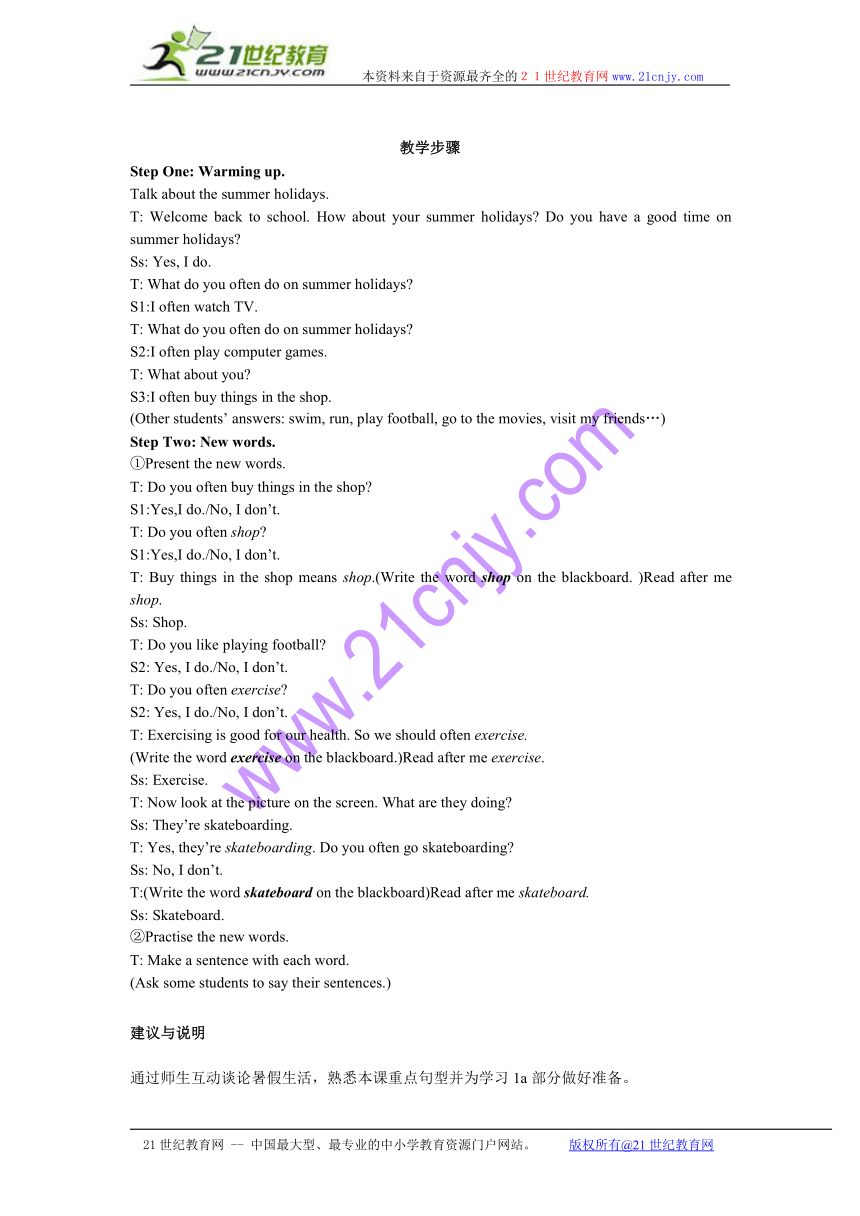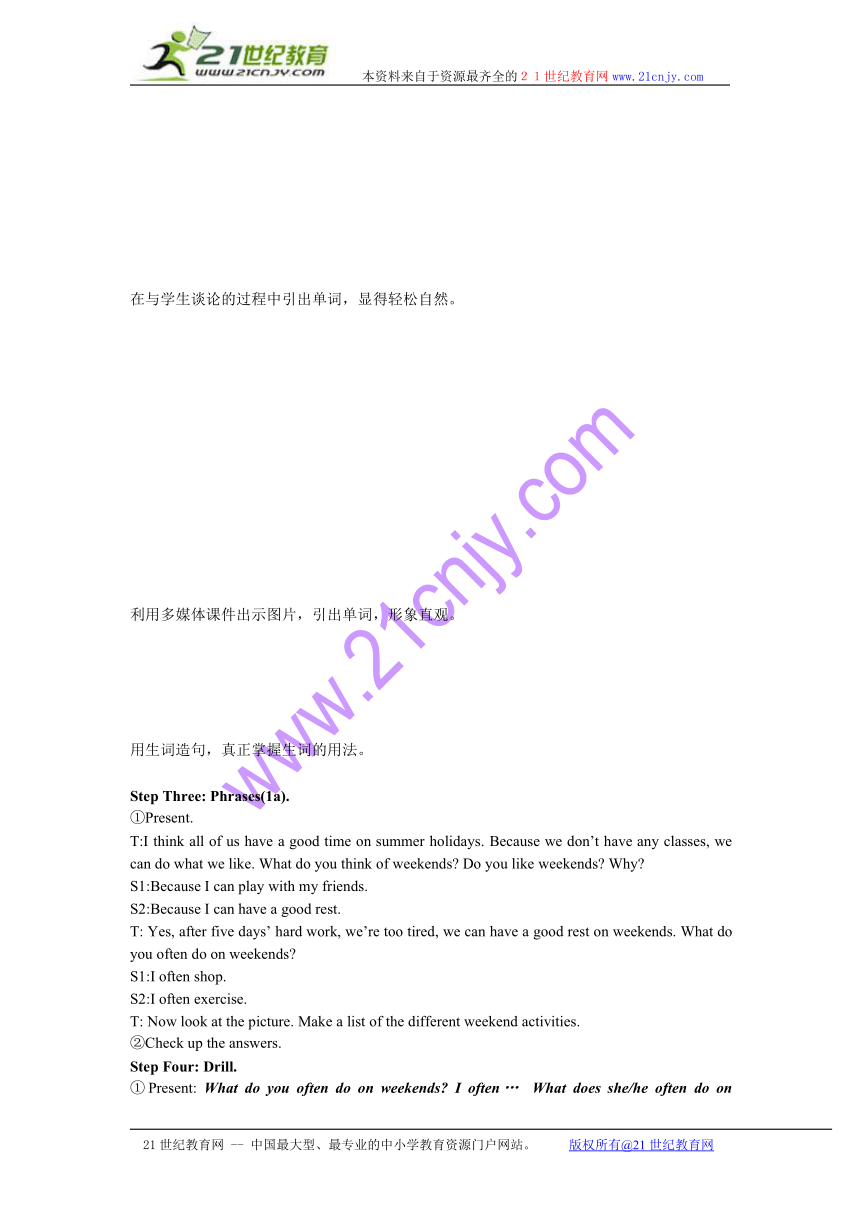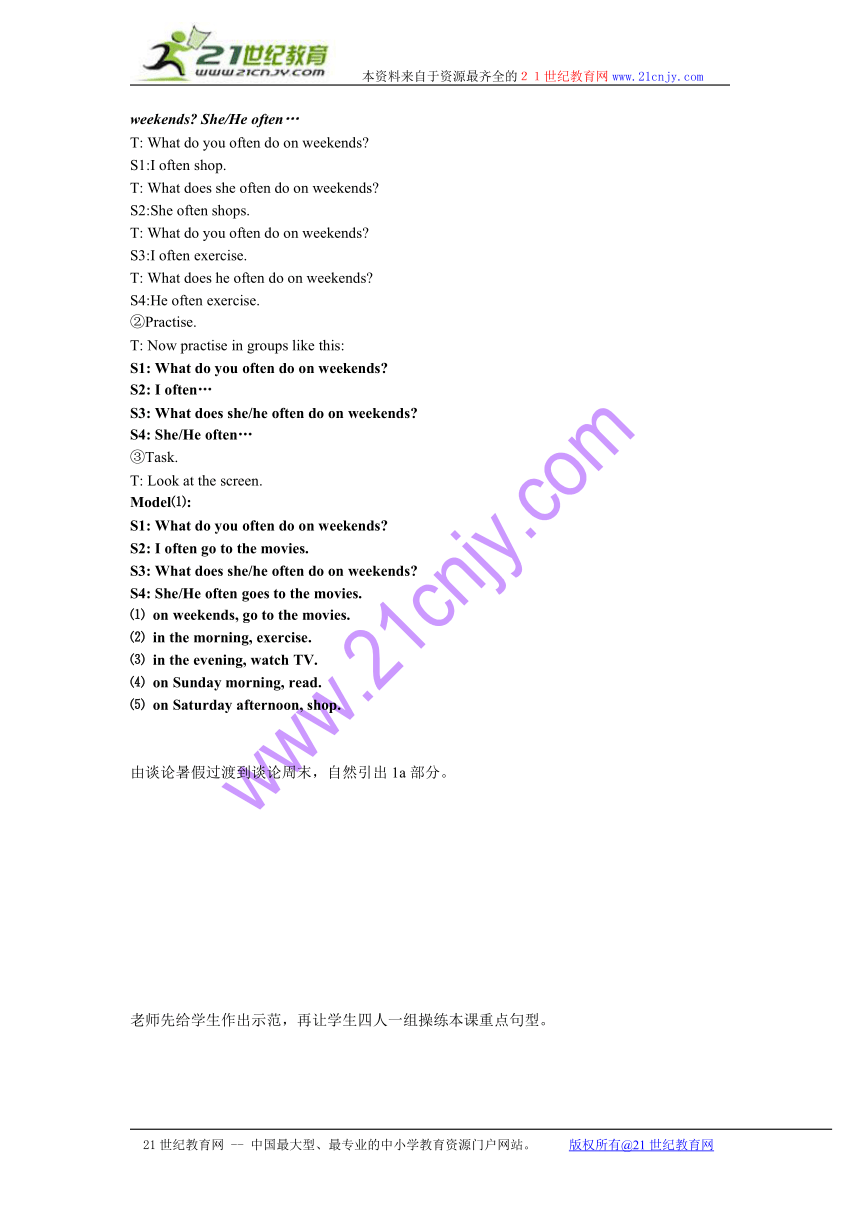Unit1 How often do you exercise.Section A 1a-1c
文档属性
| 名称 | Unit1 How often do you exercise.Section A 1a-1c |

|
|
| 格式 | rar | ||
| 文件大小 | 15.4KB | ||
| 资源类型 | 教案 | ||
| 版本资源 | 人教新目标(Go for it)版 | ||
| 科目 | 英语 | ||
| 更新时间 | 2011-03-15 11:17:00 | ||
图片预览




文档简介
Unit1 How often do you exercise
Section A 1a—1c
教学步骤
Step One: Warming up.
Talk about the summer holidays.
T: Welcome back to school. How about your summer holidays Do you have a good time on summer holidays
Ss: Yes, I do.
T: What do you often do on summer holidays
S1:I often watch TV.
T: What do you often do on summer holidays
S2:I often play computer games.
T: What about you
S3:I often buy things in the shop.
(Other students’ answers: swim, run, play football, go to the movies, visit my friends…)
Step Two: New words.
①Present the new words.
T: Do you often buy things in the shop
S1:Yes,I do./No, I don’t.
T: Do you often shop
S1:Yes,I do./No, I don’t.
T: Buy things in the shop means shop.(Write the word shop on the blackboard. )Read after me shop.
Ss: Shop.
T: Do you like playing football
S2: Yes, I do./No, I don’t.
T: Do you often exercise
S2: Yes, I do./No, I don’t.
T: Exercising is good for our health. So we should often exercise.
(Write the word exercise on the blackboard.)Read after me exercise.
Ss: Exercise.
T: Now look at the picture on the screen. What are they doing
Ss: They’re skateboarding.
T: Yes, they’re skateboarding. Do you often go skateboarding
Ss: No, I don’t.
T:(Write the word skateboard on the blackboard)Read after me skateboard.
Ss: Skateboard.
②Practise the new words.
T: Make a sentence with each word.
(Ask some students to say their sentences.)
建议与说明
通过师生互动谈论暑假生活,熟悉本课重点句型并为学习1a部分做好准备。
在与学生谈论的过程中引出单词,显得轻松自然。
利用多媒体课件出示图片,引出单词,形象直观。
用生词造句,真正掌握生词的用法。
Step Three: Phrases(1a).
①Present.
T:I think all of us have a good time on summer holidays. Because we don’t have any classes, we can do what we like. What do you think of weekends Do you like weekends Why
S1:Because I can play with my friends.
S2:Because I can have a good rest.
T: Yes, after five days’ hard work, we’re too tired, we can have a good rest on weekends. What do you often do on weekends
S1:I often shop.
S2:I often exercise.
T: Now look at the picture. Make a list of the different weekend activities.
②Check up the answers.
Step Four: Drill.
①Present: What do you often do on weekends I often… What does she/he often do on weekends She/He often…
T: What do you often do on weekends
S1:I often shop.
T: What does she often do on weekends
S2:She often shops.
T: What do you often do on weekends
S3:I often exercise.
T: What does he often do on weekends
S4:He often exercise.
②Practise.
T: Now practise in groups like this:
S1: What do you often do on weekends
S2: I often…
S3: What does she/he often do on weekends
S4: She/He often…
③Task.
T: Look at the screen.
Model⑴:
S1: What do you often do on weekends
S2: I often go to the movies.
S3: What does she/he often do on weekends
S4: She/He often goes to the movies.
⑴ on weekends, go to the movies.
⑵ in the morning, exercise.
⑶ in the evening, watch TV.
⑷ on Sunday morning, read.
⑸ on Saturday afternoon, shop.
由谈论暑假过渡到谈论周末,自然引出1a部分。
老师先给学生作出示范,再让学生四人一组操练本课重点句型。
小组长抽签决定所选题目,组员合作完成任务。
⑹ on Sunday afternoon, go skateboarding.
⑺ on Saturday evening, play computer games.
⑻ on weekends, visit my grandparents.
T:I have fourteen pieces of paper here. There is a number in each piece. Each group will choose one and cooperate like the model.
Step Five: Listening(1b).
①Summarize the words of frequency.
T: We know that often is an adverb of frequency. Do you know the other adverbs of frequency (As the students say, write them down on the blackboard. Then explain hardly ever.)Now, let’s read the words together.
②Listen.
T:A reporter wants to know what some students do on weekends. Now, let’s listen to the tape and say what everyone does.
The first time, just listen.(Play the recording.)The second time, listen and write the letters from the picture. (Play the recording. Then check up the answers.)
③Listen again and fill in the blanks.
Reporter :What do you do on weekends
Boy 1: I exercise.
Girl 1: I go shopping.
Boy 2: Beeeew… I go shopping.
I can’t stand shopping.
Girl 2: I go skateboarding.
Boy 2: And I watch TV.
Reporter: How about you
Girl 3: I watch TV. I love reading.
Reporter: Oh, why is that
Girl 3: Oh, I don’t know. I guess I just like books.
④Look at the screen, listen and repeat.
Reporter :What do you usually do on weekends
Boy 1: I usually exercise.
Girl 1: I always go shopping.
Boy 2: Beeeew… I never go shopping.
I can’t stand shopping.
Girl 2: I often go skateboarding.
Boy 2: And I sometimes watch TV.
Reporter: How about you
Girl 3: I hardly ever watch TV. I love reading.
Reporter: Oh, why is that
Girl 3: Oh, I don’t know. I guess I just like books.
⑤Read and act it out in groups
Step Six: Task.
①Make a survey about your partner, using: What do you always/
总结学过的频率副词,并学习生词hardly ever
听第一遍整体感知,听第二遍,写出图片中的对应字母。
听第三遍,填出听到的频率副词。
听第四遍,看着屏幕上的听力材料,跟读。
usually… do on weekends And fill in the chart.
Name
Always
Usually
sometimes
Hardly ever
never
②Introduce your partner according to the chart.
Write it down in your exercise book. For example: My partner is…He always…
③Ask two or three students to read their compositions.
Step Seven: Read.
①Read the passage.
T: Do you want to know what my family do on weekends Look at the screen. Let’s read together.(After reading.)Now, read and recite it.
Read this passage
On weekends, my mother always shops. My father usually watches TV, sometimes he reads, but he never exercises. I often go skateboarding with my brother. He hardly ever goes to the movies and he never shops.
②Ask two students to recite.
Step Eight: Homework.
What do your family do on weekends Make a survey and write a composition.
板书设计:
Unit1 How often do you exercise
Section A 1a—1c
Shop always
Exercise usually
Skateboard often
sometimes
hardly ever
never
通过调查,将频率副词放到本课的重点句型中进行操练
。
让学生用第三人称介绍同桌。
老师给出一篇范文,让学生诵读,为家庭作业作脚手架。
Section A 1a—1c
教学步骤
Step One: Warming up.
Talk about the summer holidays.
T: Welcome back to school. How about your summer holidays Do you have a good time on summer holidays
Ss: Yes, I do.
T: What do you often do on summer holidays
S1:I often watch TV.
T: What do you often do on summer holidays
S2:I often play computer games.
T: What about you
S3:I often buy things in the shop.
(Other students’ answers: swim, run, play football, go to the movies, visit my friends…)
Step Two: New words.
①Present the new words.
T: Do you often buy things in the shop
S1:Yes,I do./No, I don’t.
T: Do you often shop
S1:Yes,I do./No, I don’t.
T: Buy things in the shop means shop.(Write the word shop on the blackboard. )Read after me shop.
Ss: Shop.
T: Do you like playing football
S2: Yes, I do./No, I don’t.
T: Do you often exercise
S2: Yes, I do./No, I don’t.
T: Exercising is good for our health. So we should often exercise.
(Write the word exercise on the blackboard.)Read after me exercise.
Ss: Exercise.
T: Now look at the picture on the screen. What are they doing
Ss: They’re skateboarding.
T: Yes, they’re skateboarding. Do you often go skateboarding
Ss: No, I don’t.
T:(Write the word skateboard on the blackboard)Read after me skateboard.
Ss: Skateboard.
②Practise the new words.
T: Make a sentence with each word.
(Ask some students to say their sentences.)
建议与说明
通过师生互动谈论暑假生活,熟悉本课重点句型并为学习1a部分做好准备。
在与学生谈论的过程中引出单词,显得轻松自然。
利用多媒体课件出示图片,引出单词,形象直观。
用生词造句,真正掌握生词的用法。
Step Three: Phrases(1a).
①Present.
T:I think all of us have a good time on summer holidays. Because we don’t have any classes, we can do what we like. What do you think of weekends Do you like weekends Why
S1:Because I can play with my friends.
S2:Because I can have a good rest.
T: Yes, after five days’ hard work, we’re too tired, we can have a good rest on weekends. What do you often do on weekends
S1:I often shop.
S2:I often exercise.
T: Now look at the picture. Make a list of the different weekend activities.
②Check up the answers.
Step Four: Drill.
①Present: What do you often do on weekends I often… What does she/he often do on weekends She/He often…
T: What do you often do on weekends
S1:I often shop.
T: What does she often do on weekends
S2:She often shops.
T: What do you often do on weekends
S3:I often exercise.
T: What does he often do on weekends
S4:He often exercise.
②Practise.
T: Now practise in groups like this:
S1: What do you often do on weekends
S2: I often…
S3: What does she/he often do on weekends
S4: She/He often…
③Task.
T: Look at the screen.
Model⑴:
S1: What do you often do on weekends
S2: I often go to the movies.
S3: What does she/he often do on weekends
S4: She/He often goes to the movies.
⑴ on weekends, go to the movies.
⑵ in the morning, exercise.
⑶ in the evening, watch TV.
⑷ on Sunday morning, read.
⑸ on Saturday afternoon, shop.
由谈论暑假过渡到谈论周末,自然引出1a部分。
老师先给学生作出示范,再让学生四人一组操练本课重点句型。
小组长抽签决定所选题目,组员合作完成任务。
⑹ on Sunday afternoon, go skateboarding.
⑺ on Saturday evening, play computer games.
⑻ on weekends, visit my grandparents.
T:I have fourteen pieces of paper here. There is a number in each piece. Each group will choose one and cooperate like the model.
Step Five: Listening(1b).
①Summarize the words of frequency.
T: We know that often is an adverb of frequency. Do you know the other adverbs of frequency (As the students say, write them down on the blackboard. Then explain hardly ever.)Now, let’s read the words together.
②Listen.
T:A reporter wants to know what some students do on weekends. Now, let’s listen to the tape and say what everyone does.
The first time, just listen.(Play the recording.)The second time, listen and write the letters from the picture. (Play the recording. Then check up the answers.)
③Listen again and fill in the blanks.
Reporter :What do you do on weekends
Boy 1: I exercise.
Girl 1: I go shopping.
Boy 2: Beeeew… I go shopping.
I can’t stand shopping.
Girl 2: I go skateboarding.
Boy 2: And I watch TV.
Reporter: How about you
Girl 3: I watch TV. I love reading.
Reporter: Oh, why is that
Girl 3: Oh, I don’t know. I guess I just like books.
④Look at the screen, listen and repeat.
Reporter :What do you usually do on weekends
Boy 1: I usually exercise.
Girl 1: I always go shopping.
Boy 2: Beeeew… I never go shopping.
I can’t stand shopping.
Girl 2: I often go skateboarding.
Boy 2: And I sometimes watch TV.
Reporter: How about you
Girl 3: I hardly ever watch TV. I love reading.
Reporter: Oh, why is that
Girl 3: Oh, I don’t know. I guess I just like books.
⑤Read and act it out in groups
Step Six: Task.
①Make a survey about your partner, using: What do you always/
总结学过的频率副词,并学习生词hardly ever
听第一遍整体感知,听第二遍,写出图片中的对应字母。
听第三遍,填出听到的频率副词。
听第四遍,看着屏幕上的听力材料,跟读。
usually… do on weekends And fill in the chart.
Name
Always
Usually
sometimes
Hardly ever
never
②Introduce your partner according to the chart.
Write it down in your exercise book. For example: My partner is…He always…
③Ask two or three students to read their compositions.
Step Seven: Read.
①Read the passage.
T: Do you want to know what my family do on weekends Look at the screen. Let’s read together.(After reading.)Now, read and recite it.
Read this passage
On weekends, my mother always shops. My father usually watches TV, sometimes he reads, but he never exercises. I often go skateboarding with my brother. He hardly ever goes to the movies and he never shops.
②Ask two students to recite.
Step Eight: Homework.
What do your family do on weekends Make a survey and write a composition.
板书设计:
Unit1 How often do you exercise
Section A 1a—1c
Shop always
Exercise usually
Skateboard often
sometimes
hardly ever
never
通过调查,将频率副词放到本课的重点句型中进行操练
。
让学生用第三人称介绍同桌。
老师给出一篇范文,让学生诵读,为家庭作业作脚手架。
同课章节目录
- Unit 1 Where did you go on vacation?
- Section A
- Section B
- Unit 2 How often do you exercise?
- Section A
- Section B
- Unit 3 I'm more outgoing than my sister.
- Section A
- Section B
- Unit 4 What's the best movie theater?
- Section A
- Section B
- Unit 5 Do you want to watch a game show?
- Section A
- Section B
- Unit 6 I'm going to study computer science.
- Section A
- Section B
- Unit 7 Will people have robots?
- Section A
- Section B
- Unit 8 How do you make a banana milk shake?
- Section A
- Section B
- Unit 9 Can you come to my party?
- Section A
- Section B
- Unit 10 If you go to the party, you'll have a grea
- Section A
- Section B
